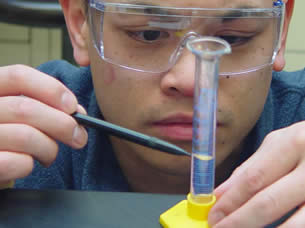Technical Standards
for Admission & Promotion & Graduation
A goal of CSU College of Pharmacy is to educate and graduate competent pharmacists
who will provide pharmaceutical care in a wide range of community and institutional
settings. The technical standards for admission, promotion and graduation set forth
by CSU-COP outline the nonacademic abilities considered essential for students to
achieve the level of competence required by the faculty and by the ACPE, the pharmacy-accrediting
agency, in order to obtain the Pharm. D. Degree.
The CSU-COP is committed to enabling students by any reasonable means or accommodations to complete the course of study leading to the Doctor of Pharmacy degree. Individuals with questions or concerns about their abilities to meet these standards are encouraged to contact the Associate Dean for Student Affairs at 773/821-2500.
Technical Standards
- Observation: Students must be able to observe experiments and demonstrations in the basic sciences, including but not limited to pharmacological and physiological demonstrations in animals, evaluation of microbiological cultures, and microscopic studies of microorganisms and tissues in normal and pathological states. Students must be able to observe a patient accurately at a distance and close at hand. In detail, observation necessitates the functional use of the sense of vision and other sensory modalities.
- Communication: Students must be able to communicate effectively and efficiently in oral and written English. They must be able to record information accurately and clearly communicate fluently and sensitively with patients and with other members of the healthcare team. Students must be able to effectively communicate with and supervise technical support staff.
- Sensory/Motor: Students must possess the motor function sufficient to accurately compound and prepare prescription products for dispensing to patients. Such actions require coordination of both gross and fine muscular movement, equilibrium, and functional use of the senses of touch and vision. They must have appropriate motor functions to elicit information from patients using basic patient assessment skills such as palpation, auscultation, percussion and other diagnostic tactics. Students must be able to execute motor movement to provide general care and emergency treatments to patients, e.g. first aid treatments, cardiopulmonary resuscitation.
- Intellectual:(Intellectual, Conceptual, Integrative and Quantitative Abilities): Students must have the ability to measure, calculate, reason, and analyze. Students must be able to synthesize and apply complex information. They must be fully alert and attentive at all times in clinical settings.
- Behavioral and Social Attributes: Students must demonstrate professional and ethical behavior appropriate to their educational level. Students must be able to function within the regulatory and institutional limits of the educational environment and modify behaviors based on criticism. Students must demonstrate compassion and integrity and a concern for others. This requires responsibility for personal actions and emotional stability under the stressful conditions which may result from their professional education.


 All Rights Reserved
All Rights Reserved